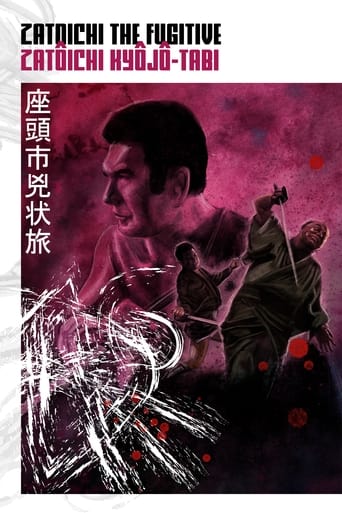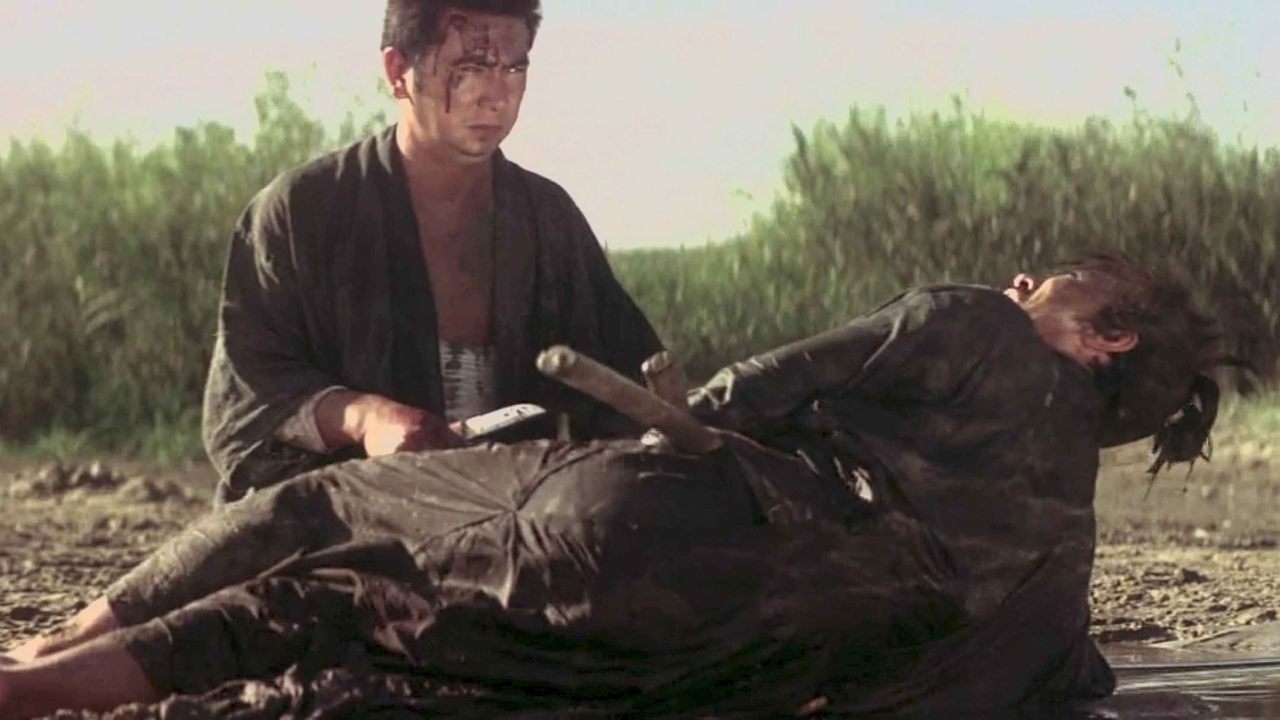MartinHafer
Perhaps I would have liked this fourth episode in the Zatôichi franchise had I not watched the third one the same day. The third, "Shin Zatoichi Monogatari", is probably my favorite of the series and after watching it for the second time, it just reinforced this in my mind. The fourth episode, unfortunately, just doesn't have the same depth of story--though it is well worth seeing nonetheless.The film starts with our hero Zatôichi fighting sumo matches at a festival and winning them all. It's an interesting juxtaposition to go from the height of success to a crushing defeat so quickly, as almost immediately after the matches, a lone knucklehead tries to kill Zatôichi--quite unsuccessfully, I might add. As the man dies, Zatôichi begs him to tell him why he tried to kill him. It seems he needed the money for his mother. In an odd case of contrition, Zatôichi goes to the dead man's mother and begs forgiveness--and gives her the bounty that was on his own head. Surprisingly, the lady stated that her son was no good and quickly forgives Zatôichi for having to kill him in self-defense.In this same town, there is the usual power-struggle. This time a young and weak yakuza recently inherited his father's business but is beset by rivals vying for his power. One of the men, interestingly enough, is with a woman who loved Zatôichi in his youth. Will Zatôichi get her back? Is she worth getting back? Will her current significant other kill Zatôichi? And, what of the young boss? Tune in to find out all these answers. Sadly, however, none of them seemed all that compelling to me--just the typical Zatôichi film plots and not a lot more--other than the relationship between Zatôichi and the mother of the man he killed at the beginning of the film.The usual excellent camera-work, writing, music and more is all here. It's just that with almost 30 films in the series, this one doesn't have a lot to make it stand out from the crowd.
Michael_Elliott
Masseur Ichi, the Fugitive (1963) *** (out of 4) The blind swordsman Ichi (Shintaro Katsu) angers a large yakuza after defeating them in a wrestling match, which will lead to a bigger fight. Directed by Tokuzo Tanaka. This here was my second film in the series and while I enjoyed most of the first one, this one here just doesn't cut it. There's way too much talking going on and none of it is even mildly interesting. Even worse is that the actual swordfights are rather lame as well. The concept of a blind swordsman is really the only thing that keeps this film (and perhaps series?) afloat.
Tom (bighouseaz)
that our hero Zatoichi cannot control.The fourth film in the Zatoichi series contains many characters and sub-plots. At times it's hard to know where it is all leading, but the viewer gains a better understanding of Zatoichi's motives. Zatoichi seeks a peaceful resolution of the typical turf war. Zatoichi supports the young, weak yakuza in his desire to wed a former rival's daughter. Zatoichi also encounters an slightly older, and far less pure Tane, his love interest from film #1.There is little action in the first hour of the film, but the final scene is hectic and full of carnage. Zatoichi finally loses restraint and goes on a blood-letting rampage that leads to the final confrontation with the truly black-hearted lover of Tane.It's a solid entry in the series. I enjoyed the sumo tournament at the beginning of the film. Yes, our hero is multi-talented. He played the shamizen in film #3, wrestles in film #4 and has other hidden skills to reveal in later movies.And once again, Zatoichi finishes the film minus his cane sword. Where does he get another cane sword for film #5?
Brian Camp
MASSEUR ICHI, THE FUGITIVE (1963) is the fourth in the series of Japanese swordplay films devoted to the exploits of Zatoichi, the blind swordsman whose super-hearing and sensitivity enabled him to perform impressive feats of derring-do. This entry is somewhat slower-paced and less action-packed than would become the norm in later Zatoichi films (which would continue to be produced through 1973). There is only one major swordfight, near the very end, but at least it's a spectacular one, with Zatoichi (Shintaro Katsu) slashing opponents right, left, front and back, although the spurting bloodshed which would soon become a distinct feature of samurai films is noticeably absent here. Zatoichi himself is also considerably less superhuman than he appears in later films.Instead, the emphasis is Zatoichi's role as mediator in a conflict between gang bosses in a town he is visiting solely to pay respects to the mother of a gang member he'd killed who'd been seeking the ten gold coin bounty on Zatoichi's head. The complex interrelationships among the characters center chiefly around two young women, one of them a former lover of Zatoichi's who is now the wife of a sword-for-hire seeking to sell his services to one of the wily bosses. Zatoichi sides with the underdog, Sakichi, who'd reluctantly inherited his father's territory but would rather marry the other young woman, Onobu (Miwa Takada), the pretty young daughter of the innkeeper, a once-powerful gang boss bearing a powerful grudge because he'd lost his territory to Sakichi's father. The gang bosses pressure the vulnerable Sakichi to use Zatoichi's trust to set a trap for him. The stage is then set for a series of confrontations that culminate in the final battle.It may be slow going for most action and swordplay buffs, but it has a formal beauty that later films in the series dispensed with in favor of more visceral thrills. The polished camerawork, largely on location, gives us stately compositions focused on the characters and their relationships. A sparing score by venerated composer Akira Ifukube adds a touch of class. Samurai films of the time routinely boasted such visual and aural elegance long before the audience demanded more bloodshed and a more excessive approach in later films (see, especially, the "Lone Wolf and Cub" series).


 AD
AD
